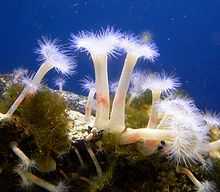Metridium
From Wikipedia, the free encyclopedia
| Plumose anemone | |
|---|---|
 | |
| Metridium senile | |
| Scientific classification | |
| Kingdom: | Animalia |
| Phylum: | Cnidaria |
| Class: | Anthozoa |
| Order: | Actiniaria |
| Family: | Metridiidae |
| Genus: | Metridium de Blainville, 1824 [1] |
| Species | |
|
| |
Members of the genus Metridium, also known as plumose anemones, are sea anemones found mostly in the cooler waters of the northern Pacific and Atlantic oceans. They are characterized by their numerous threadlike tentacles extending from atop a smooth cylindrical column, and can vary from a few centimeters in height up to one meter or more. In larger specimens, the oral disk becomes densely curved and frilly.
Species
The following species are recognised in the World Register of Marine Species (WoRMS):[1]
- Metridium canum Stuckey, 1914
- Metridium dianthus
- Metridium exilis Hand, 1956
- Metridium farcimen (Tilesius, 1809)
- Metridium huanghaiensis Pei, 1998
- Metridium parvulum McMurrich, 1904
- Metridium senile (Linnaeus, 1761)
In popular culture
Post-metal band Giant Squid used the genus name as the inspiration for the title of their acclaimed 2006 album, Metridium Fields. The final track is also titled "Metridium Field".
References
- ↑ 1.0 1.1 Metridium: de Blainville, 1824 World Register of Marine Species. Retrieved 2011-09-05.
External links
- Videos of the Metridium Fields in Monterey, CA
- Photos
- ITIS Listing
This article is issued from Wikipedia. The text is available under the Creative Commons Attribution/Share Alike; additional terms may apply for the media files.